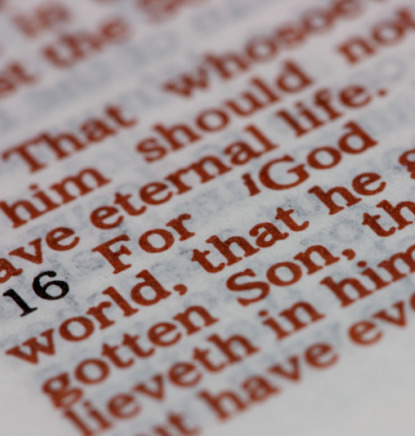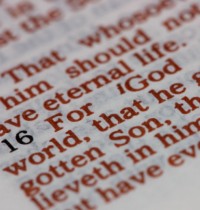 In a previous post, I listed three ways doctrinal statements can be helpful. They can help us understand Scripture, let people know what to expect in our churches, and help guide leadership decisions.
In a previous post, I listed three ways doctrinal statements can be helpful. They can help us understand Scripture, let people know what to expect in our churches, and help guide leadership decisions.
If you develop a doctrinal statement for these reasons, I would urge you to keep the the statement as basic as possible.
The length and complexity of a doctrinal statement is directly proportional to the amount of control, power, abuse, and disunity within the church that the doctrinal statement creates.
Do you really need that point about “Seven Day Creationism”? Or the paragraph about the Tribulation and the Millennium? Is the section on Tongues and the Baptism of the Holy Spirit really necessary? Must you really explain that the Five Points of Calvinism are the true Gospel as taught by Paul? Is it really that important to clarify that women and homosexuals are not allowed to be pastors in your church?
About ten years ago, when I started this website, I included a doctrinal statement on it. I updated and tweaked it until about 2007. Then I forgot about it. Just for kicks, I went and looked at it the other day, and while I still agree with almost everything on it, I decided to follow my own advice and radically simplify it.
So here is the link if you want to check it out: My unDoctrinal Statement. This includes both the old statement from 2007, and a simplified, updated statement.
Nevertheless, even though I now have a doctrinal statement (of sorts) on this blog, I am not going to emphasize it or make it prominent.
Why not?
Because I think there is a “more excellent way” of accomplishing what we want doctrinal statement to do. I will begin to write about this tomorrow.
How about you? Does your blog or church have a doctrinal statement? If so, include a link to it in the comments below. I would love to read it.




I have a a couple simple doctrinal statements I am trying to choose from…
Christ! Nothing more, mothing less, nothing else.
or
Christ! The magnet that holds everything together.
or I could get even simpler…
Christ!
All good! Whichever one you go with.
Though with that last one, someone might take offense. They might think you are cursing! Ha!
that is hilarious.
Right now, the fellowship I’m in does not (to my knowledge).
For me, right mow… Christ alone.
Like Swanny’s, you can’t go wrong with “Christ alone.”
I do prefer a mention of Christ’s resurrection – this tells me that the church has an interest in Christ just beyond his teachings.
@Dan, That’s good. Just saying “Christ alone” really means nothing. Jim Jones said that too. We all have our own idea of who Christ is. The last house church I was in believed Christ let you do whatever you wanted. You could lead a completely Libertine life and be ok because were no longer under the law. So if you said you didn’t listen to secular music for example, they called you a legalist and try condemned you for reminding them of the law (this didn’t happen to me, but we were told to leave for other reasons!) They said they followed Christ Alone.
Dan and Anthony,
Yes, at some point, some clarification on which Christ or what about Christ might be necessary. Some say (along with Paul) “We preach nothing but Christ, and Him crucified!”
But that seems to leave out the resurrection.
But what is special about the death and resurrection if we don’t know about Jesus being God, or about God being holy, or about our own sinfulness, or about death being the penalty for sin… and on and on it goes.
I don’t really have any answers here. It is just that once we start trying to clarify, where do we stop?
Some say, “My Doctrinal Statement is The Bible.” But that is not super helpful either.
It means nothing if you don’t know what the title ‘Christ’ means. I am willing to share with anyone who asks who Christ is – on a personal level.
I might amend it to “In Christ alone”….
Absolutely. This is one reason simple doctrinal statements are best – they lead to great conversations with others on a personal level. Rather than hand them a piece of paper, saying, “Read this” we can say, “That’s a great question. Let’s go get a cup of coffee and talk about it.”
I have been replying to the comments Harold made. Harold has investigated all religions over the years and has found them all to be wanting. What I don’t know did Harold investigate to prove that there was no God or was he looking to see if there was truly a God.
If it was the latter I can well understand why he is a self professed atheist as non of us religious people agree and can not answer his questions.
The problem for all religions is that they start and finish with human beings instead of God.
All leaders of religions want to control it’s members so they can show a united front, following the rules so no one can question their efficacy.
All the religions either have a philosophy or god/s which makes demands on them to behave in a certain way. I to have looked at other religions and found them all to be wanting as did Harold.
What do I believe then. I only decided to follow the God of Abraham after He ( I use this term He, knowing that He is Spirit and not male) saved me.
I will try to make this as short as possible. 30 years ago when I was in my late thirties I had a pretty good life beautiful wife three great boys 1, 6 and 8 lovely home in a desirable area in south Manchester in England, great job in the Gas Industry and in good health, brilliant.
Then one morning when I got up to go to work I sat down to have my breakfast and put the Radio on. The usual stuff was on theft, rape, murders, wars, the usual doom and gloom, I suddenly felt scared and began to shake, I turned off the radio ignoring whatever it was that effected me and drove to work. I sat at my desk surrounded by the usual chat in the open plan offices, I overheard someone talking about her friend who was dying of cancer, I began to shake and a feeling of doom overcame me, I dashed off to the toilet to get away from it all. Over the next three months the sense of doom and fear of death overwhelmed me. I went to bed to face another night of not sleeping, just thinking. I had now reached my limit and realised I could no longer live like this, I looked at the options, there was only one, kill myself, then I said, “what about the children and my wife as they all depended on me in every way”.
I lay there and said “if there is such a thing as a God will you help me and if you do I will find out about you”. The next thing I remember was waking up, I got out of bed and it dawned on me I had been asleep, I felt strangely happy, I made breakfast and turned on the radio, the usual stuff, no problem. I drove to work, usual gossip, no problem. Oh b….r I thought I’m OK. The joy that flooded over me was overwhelming. Now what do I do? I could just ignore what had happened and get on with my life, yes but if there was a God would He let me go back to the way I was, NO thank you. I knew what I had to do and when I got home, I rang my Parish Church and the next night I went to a Bible study group around the corner. I was a pain in the neck I accepted nothing they said, I questioned everything, I was so rude to these lovely people, but no one was going to pull the wool over my eyes.
I am sat here now crying my eyes out just thinking what a generous God we have, I’m so grateful. I have never looked back but been pressing on. Never give up searching Harold, He never gave up on me and He wont give up on you. Ask and you will receive, knock and He will open the door of life, seek and you will find. Love came down and rescued me and I’m so thankful. Clive
Clive,
Thank you for the excellent comment. It is caring and loving.
I am reading the autobiography of C. S. Lewis right now (Surprised by Joy ) and he was an atheist for most of his early years, and he says frequently in the atheist cannot be too careful about what he reads, because God is the hound of heaven who uses anything and everything to convince atheists that He exists.
) and he was an atheist for most of his early years, and he says frequently in the atheist cannot be too careful about what he reads, because God is the hound of heaven who uses anything and everything to convince atheists that He exists.
When Lewis finally believed, he said this about it: “[I was]the most dejected and reluctant convert in all of England. …Who can duly adore that Love which will open the high gates to a prodigal who is brought in kicking, struggling, resentful, and darting his eyes in every direction for a chance to escape? …The hardness of God is kinder than the softness of men, and His compulsion is our liberation.”
Wow.
Beautiful story, Clive!
Jeremy, I like your “unDoctrinal Statement”! It says more to me than the old one.
I agree that the short doctrinal statements are better than the long ones. Potentially, they are something akin to the pure distillate of all that we believe that is really important. Everything else is a matter for discussion, not division.
Doctrinal statements, long or short, are usually presented as a means of stating the group’s fundamental beliefs. Presumably, they can assist one in determining whether or not to become part of said group.
In practice, however, many churches and their leadership operate outside their doctrinal statements. Wealthy, powerful, influential people who may or may not personally operate within the confines of the doctrinal statement yet somehow tend to be invited to be not only part of the group, but often part of the decision makers. Those at the other end of the spectrum are often excluded. I think of this as the “unwritten” doctrinal statement by which most churches actually operate.
Few people in any church of which I have been a part know where to find their church’s doctrinal statement, much less what that doctrinal statement says. The “irregulars” have little clue how the church operates, the “regulars” sort of have a clue, and the “inner circle” knows that those who pay the bills and have the power decide how it operates (hoping to give the impression that the “doctrinal statement” has been given a nod).
Sam,
You are absolutely right about how doctrinal statements usually function within a church.
I like your idea about them being a matter for discussion, rather than division. I hope to bring out this point more clearly in the next several posts as I try to draw this series on Doctrinal Statements to a conclusion…